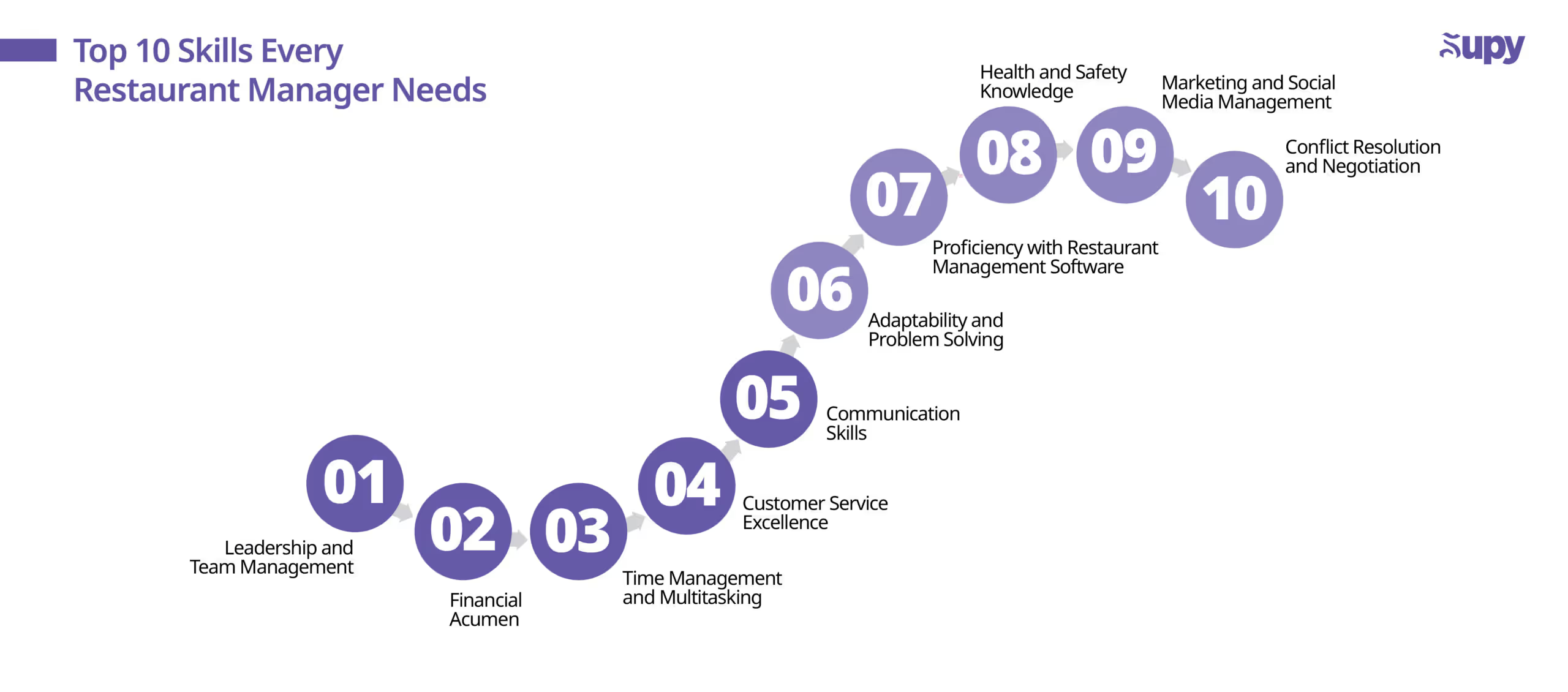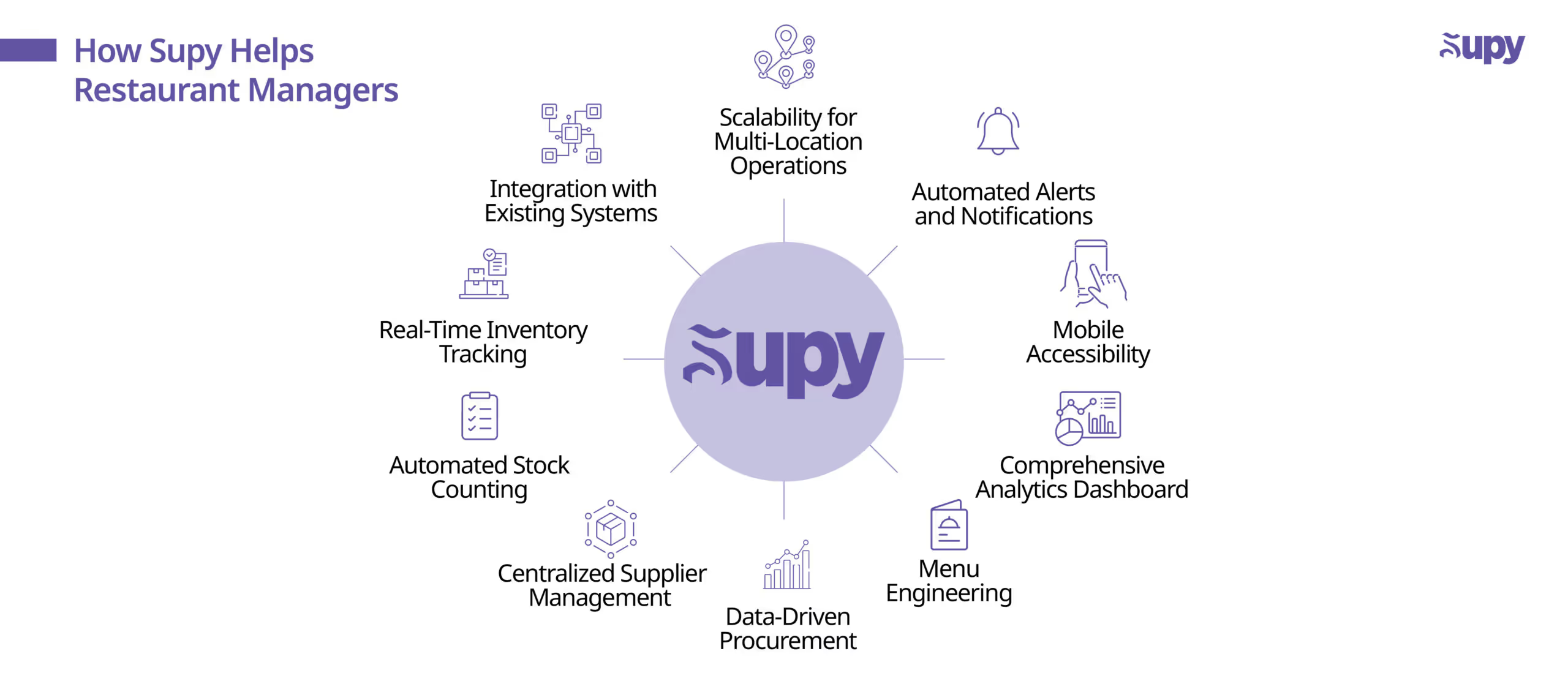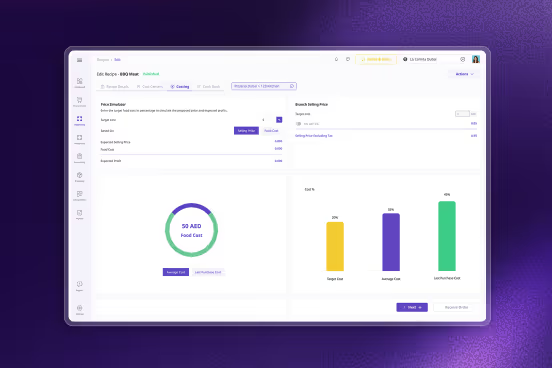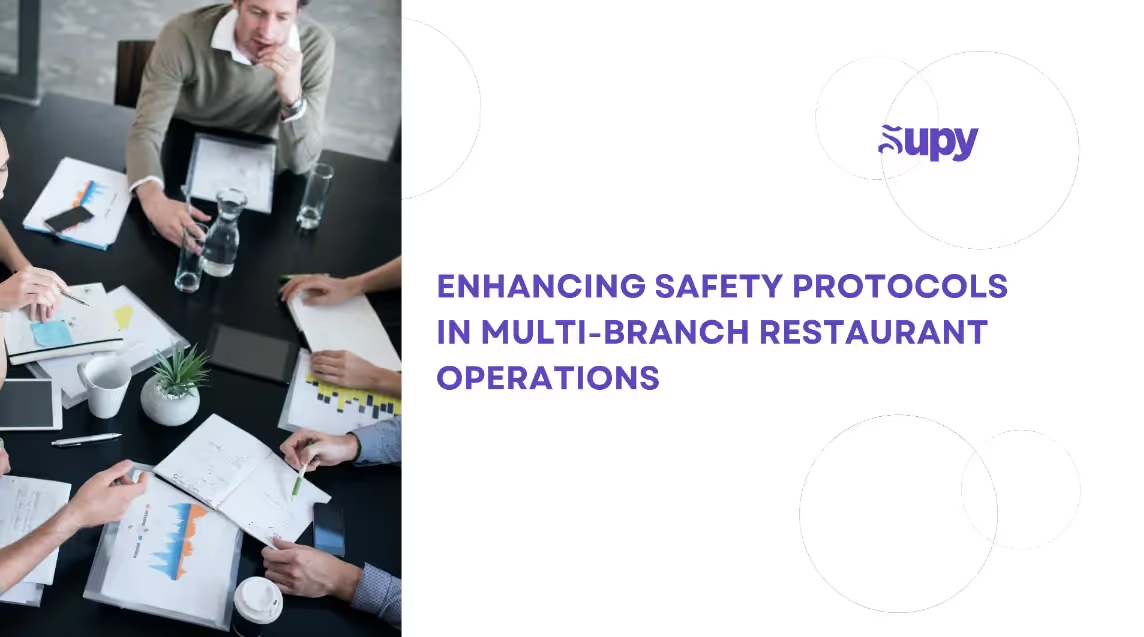10 Essential Skills Every Restaurant Manager Should Master

Managing a restaurant is anything but easy, requiring a diverse skill set to navigate the complexities of daily operations. Effective managers are pivotal in shaping the dining experience, influencing both customer satisfaction and staff performance. The last thing any business wants is poor decision-making, lacking leadership skills, and weak financial analysis skills in their manager.
In an industry characterized by high turnover rates and intense competition, the ability to lead, adapt, and innovate is a crucial skill for restaurant managers. This blog looks at the ten essential hard and soft skills every restaurant manager should master. It also provides insights into how these competencies contribute to operational success and team morale.
Table of Contents
- Ten Essential Skills Every Restaurant Manager Should Master
- Leadership and Team Management
- Financial Acumen
- Time Management and Multitasking
- Customer Service Excellence
- Communication Skills
- Adaptability and Problem Solving
- Proficiency with Restaurant Management Software
- Health and Safety Knowledge
- Marketing and Social Media Management
- Conflict Resolution and Negotiation
- How Restaurant Managers Impact Restaurant Efficiency
- Leveraging AI-Powered Restaurant Management Tools For Food Service Managers
- Case Study — Burger28
- Conclusion
- About Supy
With the right skills and modern technology at your disposal, managing staff and restaurants becomes easier and profitable. You will only require a few changes here and there to boost efficiency, promote a positive attitude among staff members, reduce employee conflicts, and see a boost in business over time. Let’s take a look at what you need to achieve that.
1. Ten Essential Skills Every Restaurant Manager Should Master

By definition, a restaurant manager ensures a restaurant runs smoothly and efficiently to help boost profits. Whether you’re operating a cloud kitchen, a new cafe or a multi-branch franchise, here are the top ten skills you need to improve your restaurant management prowess
1. Leadership and Team Management
Effective leadership is the cornerstone of successful restaurant management. A study by the National Restaurant Association highlights that 51% of restaurant operators identify staffing as a top challenge, underscoring the importance of strong leadership in retaining talent.
A restaurant manager must inspire and motivate their team, fostering a positive work environment that encourages collaboration and high performance. By setting clear expectations and providing consistent feedback, managers can enhance employee engagement and reduce turnover.
2. Financial Acumen
Since the restaurant and food service industry is extremely competitive, understanding financial metrics is essential for maintaining profitability. Food service managers should be proficient in budgeting, cost control, and financial forecasting.
Research indicates that restaurants with managers who possess strong financial acumen are better equipped to navigate economic challenges and optimize resource allocation. By regularly reviewing key performance indicators (KPIs) such as food cost percentage and labor cost ratio, managers can make informed decisions that drive financial success.
3. Time Management and Multitasking
A good restaurant manager is able to multitask while improving the team’s time management skills. In an industry like this, it is easy to work overtime, but that directly impacts team performance and customer satisfaction. Implementing structured scheduling systems and utilizing technology can aid in balancing workload and enhancing operational efficiency.
According to a survey by Choco, 44% of restaurant workers report working 11–12 hour shifts, with many feeling that their shift lengths are either too short or too long for optimal productivity. Effective managers must prioritize tasks, delegate responsibilities, and remain flexible to address unforeseen challenges.
4. Customer Service Excellence
Customers are at the heart of a restaurant’s operations, and without proper customer service, they can’t expect to become profitable. A survey by American Express found that 70% of diners are more likely to return to a restaurant where they received excellent service, even if the food was only average.
Those in a restaurant manager position play the most important role in setting service standards, training staff, and addressing customer concerns promptly. A good restaurant manager is well aware of the audience that visits the restaurant and is able to ascertain their needs, purchasing trends, and how to boost customer retention. If there is ever an issue, you must provide a fair solution that makes customers happy and isn't unfair to the supervising staff.
5. Communication Skills
The backbone of any restaurant team, be it servers, kitchen, or hospitality management, is effective communication. Clear and effective communication is vital for coordinating activities and ensuring smooth operations. Studies show that 86% of employees and executives attribute workplace failures to poor collaboration or ineffective communication.
A successful restaurant manager must convey information accurately to staff, customers, and suppliers, minimizing misunderstandings and enhancing team cohesion. Regular meetings, feedback sessions, and open-door policies can facilitate transparent communication channels. Active listening tends to help the most in this department.
6. Adaptability and Problem Solving
The restaurant industry is subject to rapid changes, from shifting consumer preferences to unforeseen challenges like supply chain disruptions. Most managers believe adaptability and a willingness to learn are more important for long-term success than technical skills alone.
Effective managers must anticipate potential issues, develop contingency plans, and remain composed under pressure. By embracing change and fostering a culture of continuous improvement, managers can navigate challenges successfully. These are part of a restaurant manager's duties, especially when they have to deal with health and safety legislation and customer complaints in a timely manner.
7. Proficiency with Restaurant Management Software
As the restaurant industry grows more digitized with cloud kitchens, online menus, and apps like Uber Eats, it is important for restaurant managers to also be on board with restaurant management software. Tools for point-of-sale (POS) systems, inventory management, and employee scheduling streamline operations and reduce errors.
Data from Restaurant 365 suggests that 41% of restaurants are ready to make the shift to AI and software to assist with sales forecasting and management. Managers should leverage these technologies to enhance efficiency, monitor performance, and make data-driven decisions for business success.
8. Health and Safety Knowledge
Maintaining health and safety standards is essential when a restaurant values the safety of both staff and customers. The Centers for Disease Control and Prevention (CDC) reports that two-thirds of foodborne illness outbreaks in the U.S. are associated with restaurants or delis.
Managers must ensure compliance with health regulations, conduct regular training, and implement safety protocols. By prioritizing health and safety, managers can prevent incidents and uphold the establishment's reputation. They must also keep in mind that a lack of compliance is often met with strict action and sometimes—the closure of the restaurant. This is not only applicable to assistant managers in food preparation but in beverage management and the customer service work in the hospitality industry too!
9. Marketing and Social Media Management
In today’s world, if you want your restaurant business to grow, it needs to have an online presence, and social media is the best way to do it. Effective marketing strategies are essential for attracting and retaining customers. By building a strong brand presence, managers can drive traffic and increase sales.
Research by Menu Tiger reveals that approximately 60% of patrons use restaurant QR code menus or promotional offers, and about 80% expect restaurants to have a social media presence. Managers should develop targeted marketing campaigns, engage with customers on social media platforms, and utilize customer feedback to refine offerings.
10. Conflict Resolution and Negotiation
A restaurant is the type of workplace that can get heated up, both figuratively and literally. Long shifts, working in extreme conditions, and the expectation of satisfying hundreds of customers a day can take its toll. Team members tend to lash out, and staff–customer conflicts can also occur.
Restaurant managers must possess strong conflict resolution skills to address issues promptly and fairly. By fostering a respectful environment and implementing clear policies, managers can mitigate conflicts and maintain a harmonious workplace. Having excellent communication skills during busy periods can boost team spirit and manage employees.
These skills aren’t just to maintain your restaurant’s operations—they’re to help it flourish. When you feel confident to expand your business, there are certain leadership skills for expansion that your restaurant manager should know, too. When you’re a restaurant manager, the learning never ends. Just consider it as one of your job duties! It’s important to stay up to date on the newest practices and requirements to help your restaurant grow.
2. How Restaurant Managers Impact Restaurant Efficiency
A lot rests on the shoulders of restaurant managers, especially when businesses are grappling with inefficiency. Their influence permeates every facet of restaurant operations, and their decisions can significantly enhance or hinder overall performance.
Whether you're managing fast food chains, overseeing restaurant staff and company policies or even advising customers, the key skills that a restaurant manager possesses help improve efficiency. Here's how:
- Optimizing Staff Performance: Managers ensure that the right number of staff are scheduled during peak hours, balancing workloads to prevent burnout and maintain service quality.
- Streamlining Operations: By refining workflows and eliminating bottlenecks, managers enhance kitchen efficiency and reduce wait times, leading to improved customer satisfaction.
- Inventory Management: Effective managers monitor stock levels, predict demand, and minimize waste, ensuring that resources are utilized efficiently and costs are controlled.
- Training and Development: Investing in staff training ensures that employees are well-equipped to perform their tasks efficiently, leading to improved service quality and reduced turnover.
- Cost Control: By monitoring expenses and identifying areas for cost savings, managers help maintain profitability without compromising on quality.
These are only the official duties of a restaurant manager; behind the scenes, they’re often holding the entire team together. When hiring a restaurant manager for your business, make sure to look for individuals who have a record of performing well, abide by company rules, know how to handle workplace culture, and are good at managing budgets and boosting operational efficiency.
Are you interested in growing your restaurant to make it profitable? Check out our Supy Podcast, This Is What Builds Profitable Businesses.
3. Leveraging AI-Powered Restaurant Management Tools For Food Service Managers

In the fast-paced world of restaurant management, staying ahead of the curve is crucial. AI-powered tools like Supy offer innovative solutions to streamline operations, reduce costs, promote strong organizational skills, streamline financial records, and improve overall efficiency.
Real-Time Inventory Tracking
Supy's real-time inventory tracking allows managers from culinary schools to monitor stock levels across multiple locations instantly. This feature helps in minimizing waste, preventing stockouts, and ensuring that inventory is always at optimal levels. By having up-to-date information, managers can make informed decisions about ordering and stock management.
Automated Stock Counting
Manual stock counting can be time-consuming and prone to errors. Supy automates this process, providing accurate counts and reducing human error. This automation not only saves time but also ensures that inventory data is precise, aiding in better decision-making.
Centralized Supplier Management
Managing multiple suppliers can be complex. Supy centralizes supplier information, allowing managers to track supplier performance, compare prices, and manage orders efficiently. This centralized approach simplifies procurement processes and helps in negotiating better deals with suppliers.
Data-Driven Procurement
Supy leverages data analytics to optimize procurement strategies. By analyzing purchasing patterns and supplier performance, managers can make informed decisions about when and what to order, leading to cost savings and improved inventory turnover.
Menu Engineering
Understanding which menu items are profitable is essential. Supy's menu engineering tools analyze sales data to identify high-performing dishes. This insight allows managers to adjust menus, promote popular items, and phase out underperforming ones, ultimately boosting profitability.
Comprehensive Analytics Dashboard
Supy's analytics dashboard provides a comprehensive view of restaurant performance. Managers can track key metrics such as sales, food costs, and labor expenses in real-time. This data-driven approach enables proactive management and timely interventions to address any issues.
Mobile Accessibility
In the restaurant industry, managers are often on the move. Supy's mobile app ensures that managers have access to critical information anytime, anywhere. Whether it's checking inventory levels, approving orders, or reviewing sales data, the mobile app keeps managers connected and informed.
Automated Alerts and Notifications
Supy provides automated alerts for various events, such as low stock levels, high food costs, or discrepancies in inventory. These notifications enable managers to take immediate action, preventing potential issues from escalating.
Integration with Existing Systems
Supy seamlessly integrates with existing POS and accounting systems, ensuring that data flows smoothly between platforms. This integration eliminates the need for manual data entry, reduces errors, and enhances operational efficiency.
Scalability for Multi-Location Operations
For restaurant chains, managing multiple locations can be challenging. Supy offers scalability, allowing managers to oversee operations across various sites from a single platform. This centralized control simplifies management and ensures consistency across locations.
By incorporating Supy's AI-powered features, restaurant managers can transform their operations, leading to improved efficiency, reduced costs, and enhanced profitability.
4. Case Study — Burger28
Burger28, a popular burger chain, faced challenges in maintaining profitability amidst increased competition and rising costs. Founder Alex E. Debare recognized the need for a data-driven approach to manage operations more effectively.
By implementing Supy, an AI-powered restaurant management platform, Burger28 gained real-time insights into inventory, sales, and staff performance. This helped the team to make informed decisions, optimize operations, and reduce waste.
The results were impressive:
- Improved Profit Margins: By optimizing inventory and reducing waste, Burger28 enhanced its profitability.
- Enhanced Operational Efficiency: Streamlined processes led to faster service and reduced operational costs.
- Data-Driven Decisions: Access to real-time data empowered the management team to make informed choices, further driving success.
Just like this, Supy has helped many restaurants streamline management, boost inventory tracking, integrate POS payment logs, and much more to boost profitability and efficiency.
5. Conclusion
In an industry as competitive as restaurant management, being able to improve operational efficiency, streamline inventory tracking, boost team morale, and prevent overtime is just an everyday thing for restaurant managers.
As technology and a fast-paced lifestyle change how customers interact with restaurants, it's important that the managers get on board with trends too. From digitizing menus to boosting social media presence, it’s the extra efforts like these that set you apart from the competition.
There are many restaurant management software tools like Supy that help you streamline processes and reduce human error. With fast technology by your side, you can easily improve your restaurant’s performance and even branch out eventually.
6. About Supy
Supy is a restaurant management software platform that's built to help multi-branch restaurants and franchises streamline their functioning. It has features like inventory management, menu engineering, procurement systems, and real-time analytics that help lower costs and boost profits by a margin. It is the go-to tool for restaurants looking to establish a stronghold in this competitive industry.
For more insights on how to run and manage a restaurant, consider checking out Supy's new all-inclusive ebook, The Ultimate Guide to Reducing Food Costs in Multi-Branch & Enterprise Restaurants.
Interested in improving your restaurant business? Schedule a demo with Supy and see the difference for yourself!







